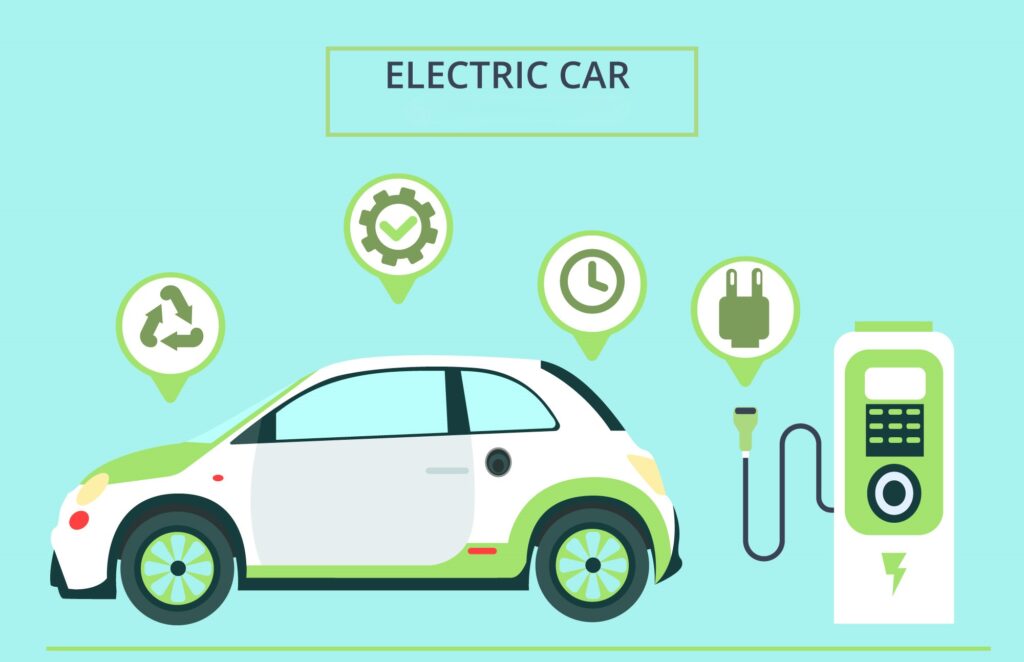Pros & Cons of Electric Vehicles

Electric vehicles (EVs) offer numerous benefits, including zero tailpipe emissions, reducing air pollution and dependence on fossil fuels. They have lower operating costs due to cheaper electricity compared to gasoline. Additionally, EVs provide smooth, quiet rides and often qualify for incentives.
However, challenges include limited driving range and charging infrastructure, longer refueling times, and higher upfront costs for purchase. Battery production also raises environmental concerns. Nonetheless, advancements continue to address these drawbacks.
Benefits of Electric Vehicles
a) Environmental Sustainability:
– EVs produce zero tailpipe emissions, reducing air pollution and greenhouse gas emissions.
– They contribute to mitigating climate change and improving air quality, especially in urban areas.


b) Energy Efficiency:
– Electric motors are more efficient than internal combustion engines, resulting in lower energy consumption per mile travelled.
c) Cost Savings:
– EVs have lower operating costs over their lifetime due to cheaper electricity compared to gasoline or diesel.
– They require less maintenance and have fewer moving parts, reducing maintenance expenses.
d) Driving Experience:
– Electric vehicles offer smooth and quiet operation, with instant torque for responsive acceleration.
– They provide a more enjoyable driving experience compared to traditional vehicles.

In summary, electric vehicles work by using electricity stored in batteries to power an electric motor, which drives the wheels. They offer numerous benefits, including environmental sustainability, energy efficiency, cost savings, and an enhanced driving experience. As technology continues to advance, electric vehicles are expected to play an increasingly significant role in the future of transportation.
Advantages of Electric Vehicles
Electric vehicles (EVs) offer numerous advantages over traditional internal combustion engine vehicles, making them an attractive option for environmentally conscious consumers and policymakers alike. Here are some key advantages of electric vehicles:

a) Environmental Benefits:
– EVs produce zero tailpipe emissions, reducing air pollution and greenhouse gas emissions. This helps mitigate climate change and improve air quality, especially in urban areas where pollution levels are high.
– As the electricity grid becomes greener with more renewable energy sources, such as solar and wind power, the environmental benefits of EVs continue to increase.
b) Energy Efficiency:
– Electric motors are more efficient than internal combustion engines, converting a higher percentage of energy from the battery into propulsion. This results in lower energy consumption per mile travelled, reducing overall energy demand.
– Regenerative braking systems in EVs capture and store energy normally lost as heat during braking, further improving efficiency.
c) Lower Operating Costs:
– While EVs may have higher upfront costs compared to conventional vehicles, they typically have lower operating costs over their lifetime. Electricity is often cheaper than gasoline or diesel on a per-mile basis.
– EVs have fewer moving parts and require less maintenance than internal combustion engine vehicles, resulting in reduced maintenance expenses over time.
d) Reduced Dependence on Fossil Fuels:
– By shifting from gasoline and diesel to electricity, EVs reduce reliance on finite fossil fuel resources. This helps enhance energy security and reduces the vulnerability of transportation systems to fluctuations in oil prices.
– Using electricity from renewable sources further decreases dependence on fossil fuels and helps diversify the energy mix.

e) Quiet and Smooth Operation:
– Electric motors operate more quietly and produce less vibration than internal combustion engines, providing a smoother and more enjoyable driving experience.
– Reduced noise pollution from EVs can benefit both drivers and communities, particularly in urban areas.
f) Flexibility in Fuelling:
– EVs can be charged at home, work, or public charging stations, providing flexibility and convenience for drivers. This eliminates the need to visit gas stations and allows for more convenient charging options.
– With advancements in fast-charging technology, EV drivers can recharge their vehicles more quickly, making long-distance travel more feasible.
g) Technological Innovation:
– The development of EV technology drives innovation in the automotive industry, leading to advancements in battery technology, electric drivetrains, and vehicle-to-grid integration.
– EVs often come equipped with advanced features such as regenerative braking, energy-efficient heating and cooling systems, and connected services that enhance the driving experience.


h) Health Benefits:
– The reduction of air pollutants from EVs can lead to significant health benefits, including lower rates of respiratory illnesses and cardiovascular diseases.
– By improving air quality, EVs contribute to creating healthier and more liveable communities for both current and future generations.
Overall, electric vehicles offer a compelling solution to the environmental, economic, and societal challenges associated with transportation. As technology continues to improve and the EV market matures, their advantages are expected to become even more pronounced, driving widespread adoption and contributing to a more sustainable future.

Disadvantages of Electric Vehicles
While electric vehicles (EVs) offer numerous advantages, they also come with some disadvantages that can influence consumer adoption and implementation. Here are several disadvantages of electric vehicles:
a) Limited Range: One of the most significant concerns for EV drivers is range anxiety, the fear of running out of battery charge before reaching their destination. While EV ranges have been improving, they generally have a shorter range compared to traditional gasoline vehicles, especially for lower-priced models.
b) Long Charging Times: Charging an EV takes significantly longer than refueling a gasoline vehicle. Even with fast charging technology, EVs can take anywhere from 30 minutes to several hours to charge, depending on the charger type and battery capacity. This can inconvenience drivers, particularly on long trips.

c) Charging Infrastructure: The availability and accessibility of charging stations remain a barrier to widespread EV adoption. While charging infrastructure is expanding, it is still not as ubiquitous as gas stations, especially in rural or less developed areas.
d) Upfront Cost: Electric vehicles tend to have higher upfront costs compared to their gasoline counterparts. This is primarily due to the cost of batteries, which are the most expensive component of an EV. While prices are decreasing as technology advances, the initial purchase price can still be a deterrent for some buyers.
e) Battery Degradation and Replacement: EV batteries degrade over time, resulting in reduced driving range and performance. While modern batteries are designed to last for many years, the eventual need for battery replacement can be costly, and the environmental impact of battery disposal and recycling is a concern.


f) Limited Model Variety: While the selection of electric vehicle models is growing, it still lags behind the variety of gasoline-powered vehicles available. Consumers may have fewer options in terms of vehicle size, style, and features when choosing an EV.
g) Energy Source Dependency: The environmental benefits of EVs depend on the source of electricity used for charging. If the electricity comes from fossil fuel sources, such as coal or natural gas, the overall environmental impact of EVs may be diminished.
h) Infrastructure Strain: The widespread adoption of EVs could put strain on the electricity grid, especially during peak charging times. Without upgrades to the grid infrastructure, increased demand for electricity could lead to issues such as power outages or increased electricity prices.

i) Cold Weather Performance: EVs can experience reduced range and performance in cold weather due to the impact on battery efficiency. Heating systems and battery warming can drain the battery faster, reducing overall range.
j) Recycling and Environmental Impact: While EVs produce fewer emissions during operation, there are environmental concerns associated with the production and disposal of batteries. Battery manufacturing requires significant energy and resources, and improper disposal or recycling could lead to environmental contamination.

Addressing these disadvantages through technological innovation, infrastructure development, and policy support will be crucial for accelerating the adoption of electric vehicles and realizing their full potential as a sustainable transportation solution.


